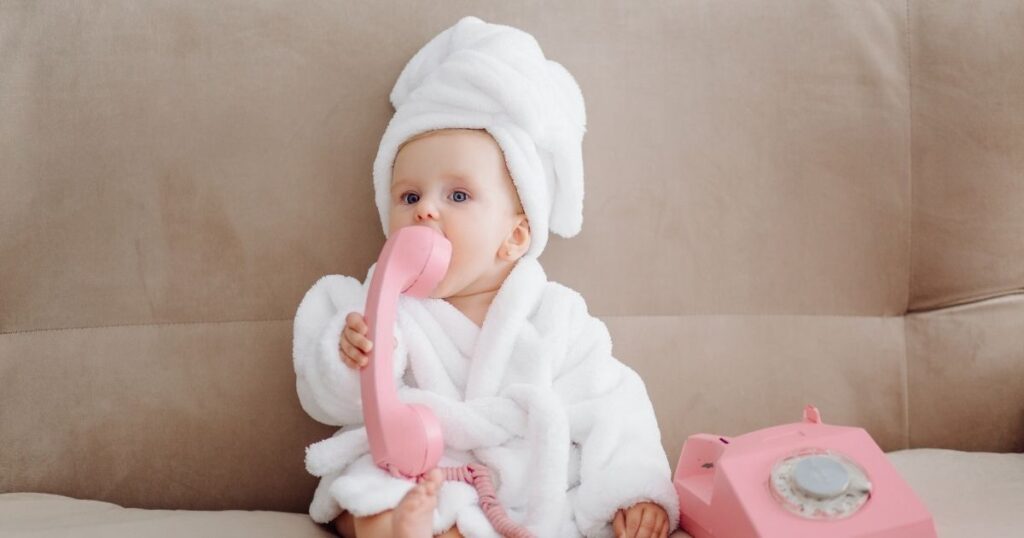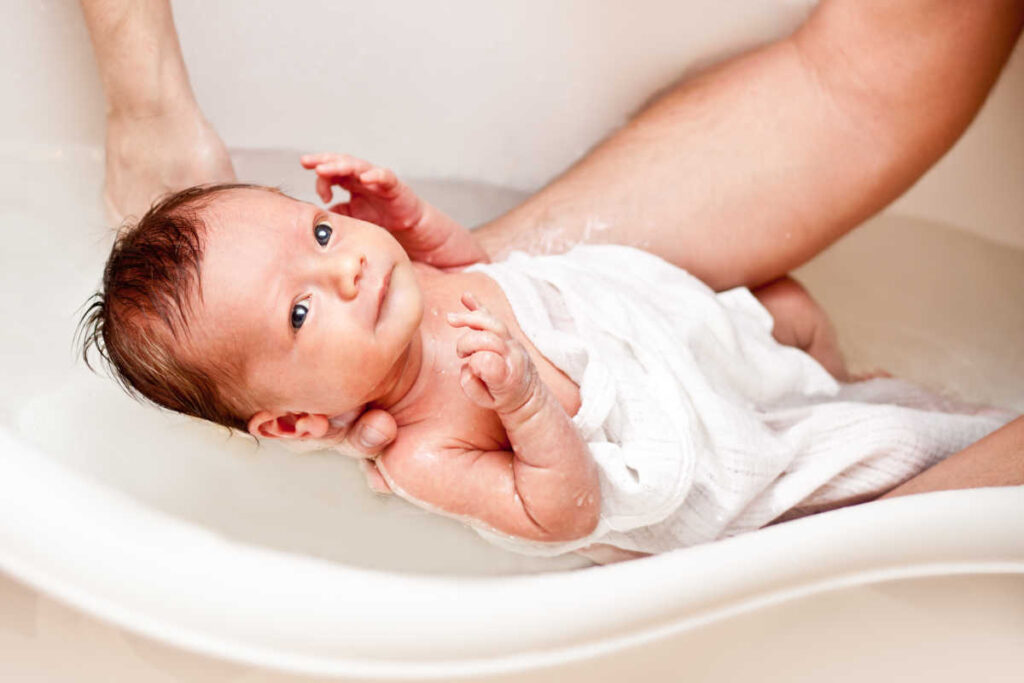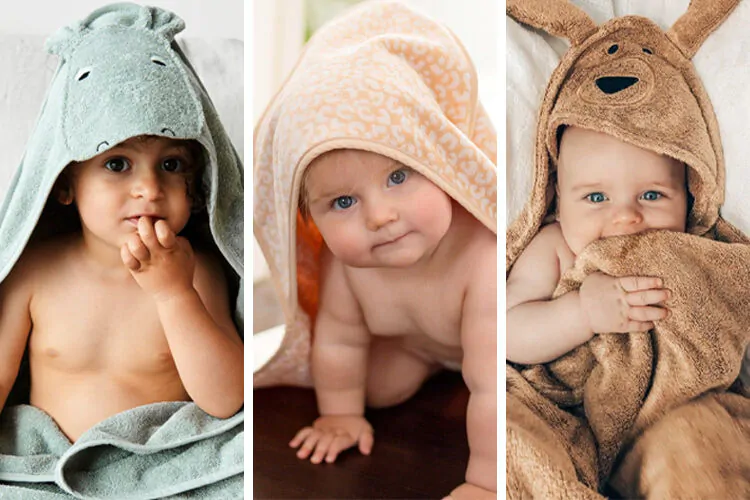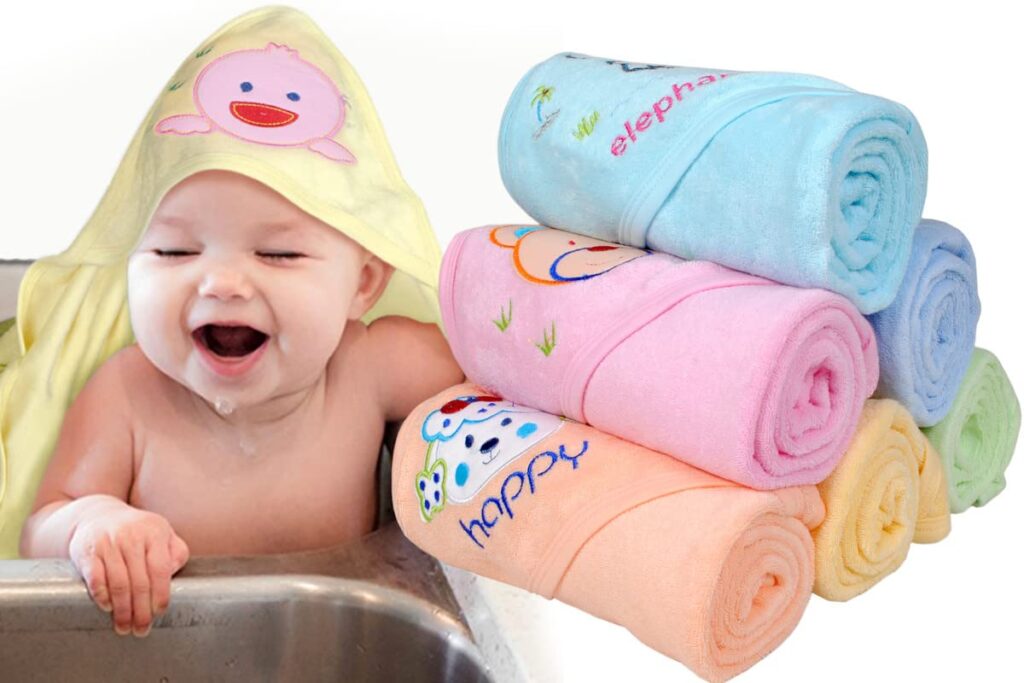There are several reasons that explain why babies need special towels. Baby towels are made with the unique requirements of newborns in mind. Newborns are very sensitive; their skin needs extra special attention. Keeping in mind all these aspects, every parent is searching for the best towels for their babies.
Table of Contents

Here are some things that explain babies need special towels:
Softness
To be kind to a baby’s fragile skin, baby towels are usually made of soft, gentle fabrics like cotton or bamboo. Its suppleness aids in avoiding pain and irritability.
Baby towels are more manageable for drying a baby’s little body because they are frequently smaller than ordinary towels. Additionally, the smaller size facilitates safe wrapping of the infant following bath time.
Hooded Towels
A lot of baby towels have hoods, which keep the baby’s head extra warm and comfortable after a bath. Additionally, the hood can help remove extra moisture from the baby’s hair.
Absorbency
After a bath, baby towels are made with an absorbent material to swiftly dry the child. In order to keep the infant comfortable and from becoming overly cold, this is crucial.
Cute and vibrant designs
These are a common feature of baby towels, making them appealing to both parents and infants. These patterns, which frequently have animal, character, or other whimsical themes, can make bath time more fun.
It’s not strictly necessary, but special baby towels can be useful and made with characteristics specifically for babies. For young babies, many parents use conventional, soft towels without any problems. If you decide to use ordinary towels, make sure they are devoid of harsh chemicals or fabric softeners that could irritate the baby’s skin. They should also be clean and soft.
The decision ultimately comes down to personal taste and what suits you and your child the best. If you decide to use standard towels, make sure they are soft enough for delicate skin and offer your baby the comfort they require after a bath.
How can I clean my baby’s face?
Keeping your baby’s hygiene up to date requires cleaning their face. The following are general actions you can take:

Assemble Materials:
- pristine, soft washcloth
- gentle baby cleanser or soap
- Hot water
- A gentle rag or towel to dry
Cleaning Your Hands:
To ensure hygiene, wash your hands well before contacting your baby’s face.
Establish a spotless surface.
Place your infant on a soft towel on the floor or on a changing table for a secure and cozy place to rest.
Moisten the dishtowel.
Take some warm water and wet a nice washcloth. Make sure your baby is not uncomfortable by making sure the water is not too hot.
Incorporate a Tiny Amount of Cleanser:
Apply a small quantity of gentle baby soap or cleanser to the damp washcloth if that’s your preference. To prevent irritation, use a cleaner made especially for infants.
Wipe the face gently:
Using the soapy washcloth, gently wipe your baby’s face starting from the forehead and working your way down to the chin. Take extra care while handling your baby’s eyes and ears, and keep soap out of their eyes.
Wash Your Ears and Neck:
Be mindful of the neck and the area behind the ears, since these can also gather debris and remnants of milk.
Wash the fabric again:
To get rid of any soap residue, give the washcloth a good rinse.
Remove Soap:
Cleanse your baby’s face of any soap residue with the rinsed washcloth. Ensure that their skin is free of any soap or cleanser residue.
Pat Drier:
Using a soft towel or cloth, gently pat the dry skin of your baby. Since a baby’s skin is sensitive, avoid rubbing them.
Hydrate (Optional):
You can use a light, fragrance-free baby moisturizer to keep your baby’s skin hydrated if they have dry skin. This step is optional, though, and not all babies may require it.
To prevent irritation, always be careful and use mild products made for newborns. See your pediatrician for particular guidance if your child has any skin disorders or concerns. Furthermore, watch out for any indications of allergies or skin irritation, and stop using any substance that makes you feel uncomfortable.
How can I choose the best baby towel?
The most important things to take into account while selecting the best baby towel are your kid’s comfort, safety, and usefulness.

The following advice will help you select the best baby towel:
Article:
Choose materials that are absorbent, soft, and delicate, like bamboo or 100% cotton. These materials offer good absorbency and are gentle on a baby’s sensitive skin.
Warm Towels:
Babies love hooded towels because they keep their heads warm and offer additional coverage. They are helpful for drying the infant’s hair as well.
Dimensions:
Select a size that fits a baby properly. Because baby towels are typically smaller than regular towels, handling and wrapping them around a newborn is made easier.
Intenseness:
Generally speaking, a medium-thickness towel is a decent option. It should have just the right amount of thickness to be absorbent without becoming cumbersome or heavy to handle.
Sturdiness:
Seek for towels that are well-made and have hems that are firmly stitched. This guarantees longevity and durability, which is important given that baby goods are frequently washed.
Insolubility:
Make sure the towel has enough absorbency to aid in rapidly drying your infant after baths. Towels made of premium cotton and bamboo are renowned for being highly absorbent.
Security:
Select towels composed of non-irritating and hypoallergenic fabrics. Steer clear of towels with scratchy or abrasive textures as they could hurt your baby’s delicate skin.
Simple Care:
Make sure the towels you choose are durable and easy to maintain. Towels that can be tumble-dried and washed in a machine are practical for working parents.
Style and Hue:
The pattern and color of the towel can make bath time more enjoyable, even though they are not as important as other considerations. Pick patterns that both you and your child will like, and go for light hues so that stains can be seen clearly.
No Chemicals:
Make sure there are no dangerous chemicals, colors, or additions in the towel. If you are worried about possible irritants, look for towels that are branded as “organic” or “free from harmful substances”.
Name Recognition:
Think of reliable brands that have received good feedback. Examining other parents’ experiences might provide you with information about the effectiveness and build of particular baby towels.
Expenses:
Budget sensibly for a baby towel. Although quality matters, there are plenty of reasonably priced solutions that satisfy safety and comfort standards.
When using the baby towel for the first time, don’t forget to wash it to get rid of any remaining chemicals or contaminants. By taking these things into account, you can choose a baby towel that will satisfy your baby’s demands and make bath time enjoyable and comfortable.
Is a microfiber towel good for a baby?
Although microfiber towels have a reputation for being absorbent and drying quickly, they might not be the best option for baby towels.

Microfiber good or bad for baby
Here are some things to think about:
Sensitivity:
In general, microfiber towels are not as soft as typical baby towel materials like cotton or bamboo. Because of their delicate skin, babies typically feel more at ease in softer fabrics.
Distraction:
When wiping a baby’s face or body, microfiber can have more friction than softer materials, thus it might not be as kind to their sensitive skin.
Materials:
To improve their effectiveness, certain microfibre towels could be treated with chemicals or additives. It’s important to take into account the likelihood of chemicals coming into touch with a baby’s skin while selecting a towel for them.
Retention of Heat:
Because microfiber can retain heat, it might not be the best material for a newborn, particularly in warmer climates. Making ensuring the baby is comfortable and doesn’t overheat is crucial.
Design of Hooded Towels:
Hooded towel designs are popular for babies since they provide additional coverage for the baby’s head and aid in heat retention; however, microfiber towels may not be as appropriate for these types of towels.
Taking these things into account, choosing towels for newborns that are made of natural fibers, such cotton or bamboo, is frequently advised. Due to their famed softness, breathability, and absorbency, these materials are more breathable, pleasant, and suited for a baby’s delicate skin.
You can test the softness and tenderness of a microfibre towel on a little, discrete area of your baby’s skin if you still want to use it for them. Before using the towel, make sure to review its care instructions and any possible chemical treatments.
When selecting towels and other materials for your infant to use, keep their comfort and safety first. When in doubt, speak with your pediatrician or select towels made especially for infants, making sure they are composed of soft, hypoallergenic fabrics.
want to buy towel click here